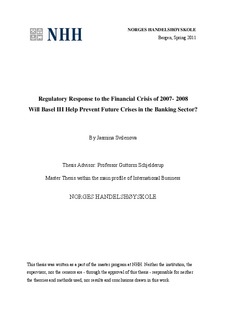Regulatory response to the financial crisis of 2007-2008 : will Basel III help prevent future crises in the banking sector?
Master thesis
Permanent lenke
http://hdl.handle.net/11250/168911Utgivelsesdato
2011Metadata
Vis full innførselSamlinger
- Master Thesis [4372]
Sammendrag
This thesis analyses the shortcomings of the international banking regulation as a cause of the
financial crisis of 2007-2008 and evaluates the effectiveness of the post-crisis regulatory
architecture for prevention of future crises in the banking sector. It shows that the
international standards for banking regulation and supervision -Basel I and Basel II- effective
at the onset of the crisis, were not strong enough to protect the banking sector from the
financial turmoil because they contained loopholes allowing regulatory arbitrage and
encouraging perverse practices which eventually led to the breakdown of the global financial
system and destabilized the world economy. The new international regulatory framework
Basel III has managed to address most of the lessons of the financial crisis and to close the
gaps revealed in Basel II. However, some issues remain unsolved and they might undermine
the regulatory effort to ensure global financial system stability in the future. The analysis of
the achievements and the outstanding problems of Basel III leads to the conclusion that Basel
III will not be able to completely eliminate the possibility of future crises in the banking
sector primarily because it leaves the shadow banking sector out of its scope. Nevertheless, it
has a strong regulatory base and potential to reduce the likelihood of future crises or at least to
mitigate the disruptive effects on the banking system associated with such events provided
that it is timely and consistently implemented across the globe. It is also important that the
international banking regulation be regularly updated in step with the financial innovation if
the objective of financial system stability and resilience is to be achieved in the long run.
